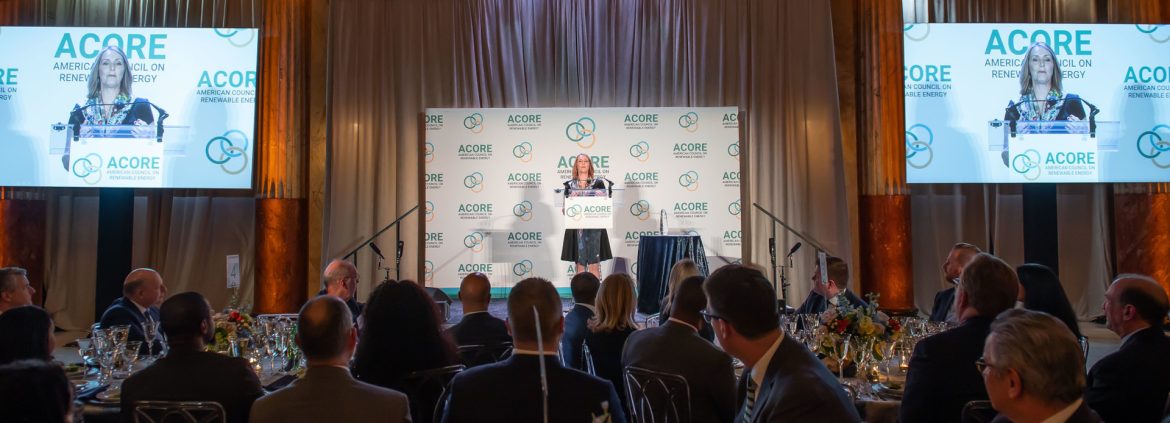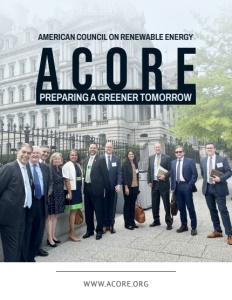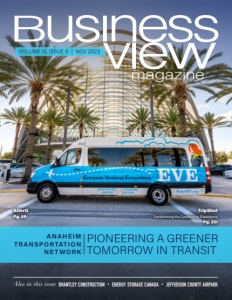ACORE
Preparing a greener tomorrow
American Council on Renewable Energy sets the agenda for a cleaner and greener future
The need to look at renewable forms of energy is only growing stronger for countries across the world. While there may not be a clear consensus on which type of renewable energy will take the lead, there is firm agreement that a cleaner and greener future remains high on the global agenda.
Helping to represent the industry in the U.S., the American Council on Renewable Energy (ACORE) is playing a key role in both the education and advocacy necessary to move the renewable transition forward.
ACORE is a 501c3 national nonprofit organization that was founded in 2001 to bring together leading proponents from all aspects of the renewable energy sector to move renewable energy into the mainstream of America’s economy.
ACORE was the first organization dedicated to expanding the U.S. pan-renewable economy, and today its members are responsible for 90 percent of America’s booming utility-scale renewable energy capacity growth. On an annual basis, ACORE convenes conferences focused on renewable energy policy, renewable energy financing, and the electric grid: three major areas that shape and advance renewable energy innovation and development in America.
ACORE President and Chief Executive Officer Gregory Wetstone recently shared more.
“In 2022,” Wetstone informs, “ACORE proudly celebrated its 20th anniversary. For more than two decades, ACORE has sought to unite finance, policy, and technology to accelerate the transition to a renewable energy economy.”
He adds that during the first 20 years of ACORE’s existence, nearly 260 gigawatts of renewable energy were deployed in the United States, and the renewable energy sector attracted nearly $600 billion in private investment. Along the way, ACORE has earned a sterling reputation, producing high-quality research and policy analysis, hosting best-in-class events, and serving as the focal point for collaborative advocacy across the renewable energy sector.
Wetstone continues that ACORE’s membership is perhaps its greatest strength, as it was truly the first organization to unite companies from across the technology and transaction space to promote the broad expansion of the renewable energy economy.
“Our members include the full range of renewable energy technologies: onshore and offshore wind, solar, hydro, hydrogen, storage, etc.,” he informs, “and hail from all aspects of the renewable transaction space, including tax equity investors, lenders, developers of projects and transmission, manufacturers, corporate buyers, you name it. If they are part of a renewable energy deal, they are in the mix at ACORE.”
Companies participate in ACORE to be a part of that network, gain perspective and information from its policy and research experts, and leverage those relationships and insights to help grow their businesses, as Wetstone reveals.
“We are the ear to the ground for many companies,” he says, “and we stay in close contact.”
Wetstone informs that ACORE is a small group, composed of just about 30 full-time staffers. However, as he adds:
“We punch way above our weight class. The size of our staff also allows us the benefit of staying nimble. Our members help guide our policy priorities each year, which include an emphasis on implementation of the Inflation Reduction Act (or IRA), project finance, trade policy, transmission and market issues, siting and permitting reform, sustainable investing, workforce development and ongoing efforts to accelerate a just transition to a renewable energy economy.”
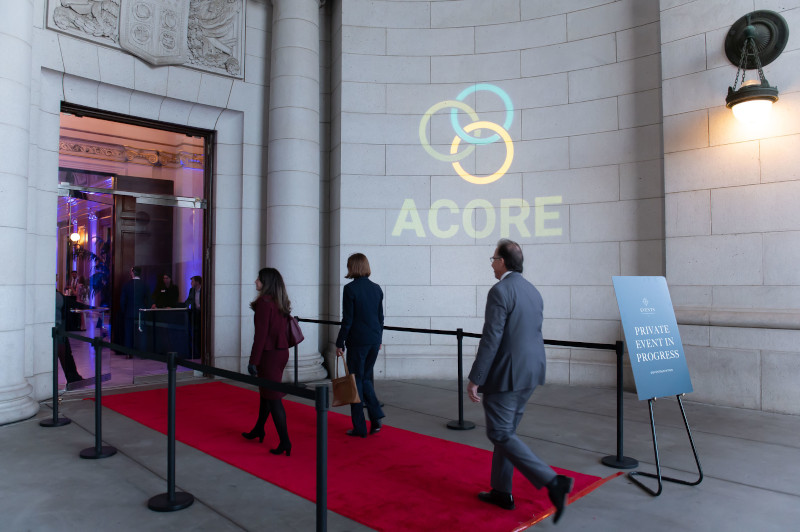 A brighter, greener, and more sustainable future
A brighter, greener, and more sustainable future
Wetstone also looked into his metaphorical crystal ball. How will ACORE continue doing what it does for the long years ahead? The future, he says, is a bright one.
“Thanks largely to the certainty provided by the IRA,” he adds, “we have never had more momentum. America has never been a more attractive venue for renewable energy investment than it is today. We released a survey in June on the expectations for renewable energy finance, and for the first time in the six years we’ve conducted investor surveys, investors were unanimous about their expectations for the U.S. market increasing in attractiveness compared to other leading countries.”
As Wetstone points out, an impressive 84 percent of surveyed investors plan to increase their renewable energy investment in the United States by five percent or more just this year alone. What’s more, reflecting a new trend that would have been inconceivable before the enactment of the IRA, some 38 percent of investors now plan to invest in clean energy manufacturing facilities here in America, Wetstone elaborates.
“We project that investments in renewable generation and enabling technologies will accelerate from the current $50 to $60 billion annually to $90 to $100 billion annually,” he says, “which is more in line with our national climate goals.”
Yet despite the remarkably positive outlook for renewable investment in the United States, persistent challenges could impede the momentum for clean energy growth. Supply chain constraints, trade restrictions, interconnection queue delays, and insufficient transmission capacity are significant headwinds identified in the survey as leading to delays in deal flow, longer lead times, and increased project costs, and this is where ACORE is focusing its attention as an organization, as Wetstone points out.
“To realize the IRA’s full potential,” he says, “we must resolve these challenges. It is more important than ever that these obstacles are addressed in short order to start delivering the pollution-free, renewable energy that the American people want and that scientists say is essential for a climate-safe future.”
Of equal importance, as he also points out, the scientific consensus is clear that efforts must be redoubled to prevent a climate catastrophe, and ACORE will play a leading role in meeting this existential challenge.
“We’re proud to have celebrated two decades of extraordinary growth,” Wetstone says, “and are now focused on the next 20 years of critically important efforts to complete the energy transition.”
ACORE is also making significant contributions towards sustainability and net zero, as Wetstone points out.
“Renewable energy is indispensable to any effective response to the climate crisis,” he observes. “Last year, 28 percent of U.S. greenhouse gas emissions were from the electric power sector. Increased renewable energy generation, provision, use, and investment are critical to effective climate transition strategies to help reduce climate risks and enhance climate opportunities.
“At ACORE,” he adds, “we focus on the most significant climate policy options and their impact on renewable energy growth and investment, along with complementary measures to ready the electric grid for the higher levels of renewable energy penetration necessary to achieve ambitious greenhouse gas emission reductions. We also work to increase corporate investment into climate opportunities, such as renewable energy, by helping to enhance sustainability/ESG disclosures and reporting.”
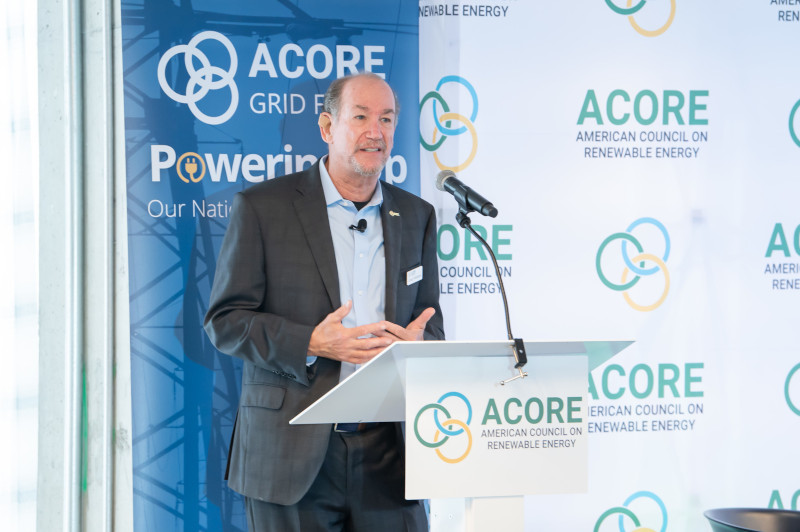 The Macro Grid Initiative
The Macro Grid Initiative
Wetstone discussed the Macro Grid Initiative and how it will facilitate a cleaner environment.
“The Macro Grid Initiative is an effort to promote investment in 21st-century transmission infrastructure that enhances reliability, improves efficiency, and delivers more low-cost clean energy,” he informs. “The United States must build out its transmission system to better connect the nation’s rich renewable energy resources to the population centers with the greatest electricity demand.”
He cites a recent study by Princeton University that shows that the IRA could reduce greenhouse gas emissions by about one billion tons annually by 2030 if the United States will more than double the pace of transmission expansion from the last decade. On the flip side, more than 80 percent of potential emission reductions from the IRA in 2030 would be lost, should transmission expansion continue at the current pace of about one percent of growth per year.
As an ACORE program, the initiative develops research to identify solutions to expanding the United States’ transmission capacity and convenes regulators, renewable, storage, and transmission companies, and other leading grid experts to help implement these solutions, as Wetstone points out.
He also spoke of ACORE’s annual forums, specifically the ACORE Grid Forum, which took place recently on Oct. 11 in Arlington, Va.
“ACORE’s events provide important virtual and live venues for attendees to network with leading experts in the field,” says Wetstone, “while gaining valuable insights on the policies, financial trends, and grid issues most pertinent to the renewable energy sector. Our signature forums include the ACORE Policy Forum in the spring, the ACORE Finance Forum in the summer, and the ACORE Grid Forum in the fall.”
At the ACORE Grid Forum, speakers addressed the near-term gaps and long-term priorities for grid infrastructure to maximize the deployment of renewable energy.
AT A GLANCE
ACORE
What: a national nonprofit organization that unites finance, policy, and technology to accelerate the transition to a renewable energy economy
Where: Washington, D.C.
Website: www.acore.org
